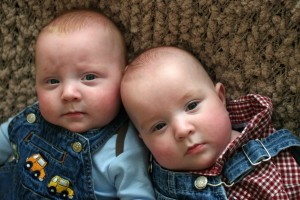Sarah is a reader turned friend I’ve been corresponding with via email for months. I really appreciate her insightful comments and was delighted when she agreed to guest post here.
Marfan first entered my family’s vocabulary when I was three months old, and it had just killed my father.
Our understanding of it grew as I did, through my misshapen bones and the failed childhood surgeries to repair them, through the genetic screenings and loose joints and floppy heart valves, through my teenage denial and eventual acceptance of a part of me to be neither loved nor loathed.
My truce with Marfan lasted until the eve of my 30th birthday, when my biological clock became a time bomb. I both ached for a child and feared losing it to Marfan like I’d lost my father. I simply couldn’t take that chance.
Geneticists offered few options. I could get pregnant and then use my family’s mapped mutation to test the baby before birth. But my soul would not have survived extinguishing a life whose only wrong was to be too much like me.
I could adopt. I knew many families joined by love and not blood. But I desperately wanted the joy of creating a life, of being pregnant and giving birth to a child no one could question was my own.
The only road left was to use fertility treatments and genetic screenings to ensure any baby I became pregnant with would not have Marfan.
For weeks I ingested, inhaled and injected myself with hormones, slowly losing my grip on reality as the pharmaceuticals took control. However, luck was with us. We fertilized 20 eggs, creating a veritable army of future infants to fill my empty arms.
At three days old, a single cell from each of my would-be babies was shipped from my home in western Canada to Detroit Michigan to be tested. The results took my breath away.
Fourteen of my embryos had Marfan. Another four were weak and likely not to survive. I had just two healthy embryos to create my family. TWO. And there was no guarantee if we froze one of these embryos for later that he or she would make it.
So we did the only thing we felt we could. We put all our eggs in one basket and held our breath.
Six weeks later I was staring at an ultrasound of my babies – both of them.
Overjoyed to be pregnant, it took mere seconds to realize that my high-risk pregnancy had just become doubly complicated. I’d aimed to be one of a handful of Marf-mom’s to give birth in my city. I was now the only expecting twin Marf-mom in my zip-code.
Undaunted, I marshalled my medical troops. A high-risk obstetrician was enlisted and my cardiology team supplemented with a trio of physicians who would monitor my blood pressure, joints and skeleton monthly. Even my Marf-specialist eye doctor was brought in to consult on how labour could affect my retinas.
Desperate for information I surfed the web, stumbling on this Marf Mom blog and taking solace in all the guest postings of women who had their own families. For as my waistline expanded, so did my dread. Something felt wrong.
Exhaustion plagued me every second of the day. Soon staircases were too much for me, and a simple walk in from the parking lot felt like a marathon.
Twenty-five weeks into my pregnancy, my cervix disintegrated and I went into labour.
For 48 harrowing hours we tried everything to keep my twin boys inside me. But the time for bed rest and drugs was past. And this March, my sons came into this world three and a half months too soon.
Baby W was born weighing 1 pound 11 ounces. His brother Baby D arrived one minute later weighing 1 pound 15 ounces. They couldn’t breathe on their own, eat on their own and their eyes were fused shut like kittens. They were rushed to incubators, too fragile to even be held up to my face for a few seconds before heading to the NICU.
I felt broken. Betrayed by my body, my boys were clinging to life inside an artificial womb instead of in me.
In the following days, I watched my eldest undergo heart surgery and my youngest fight off a deadly infection. They would both be pumped full of countless drug and blood transfusions. But my miniature men seemed as hell bent on being part of this family as I’d been to make them. They fought.
Everything came slowly for us. I held my firstborn for the first time when he was seven days old, fed the twins for the first time at eight weeks old and waited 102 days before I could have both my boys come home from hospital. But they did come home.
There are plenty of challenges ahead for us. At nearly nine months old, my twins may be nearly 20 pounds each but they are still trying to come off oxygen supports. And with compromised immune systems they must be kept isolated for fear that a simple cold could devastate their fragile lungs. But with each day they grow stronger. And with all their antics, giggles and cuddles it is easy to forget how close we came to losing them.
Lately, caught up in the whirl of diapers and feedings and bouncing baby boys, I’ve forgotten all about Marfan. Because when my twins were born they brought a new phrase into our vocabulary – micro-preemie — and we will learn what that means as they grow up, just like I did.


7 Comments
Leave a reply →